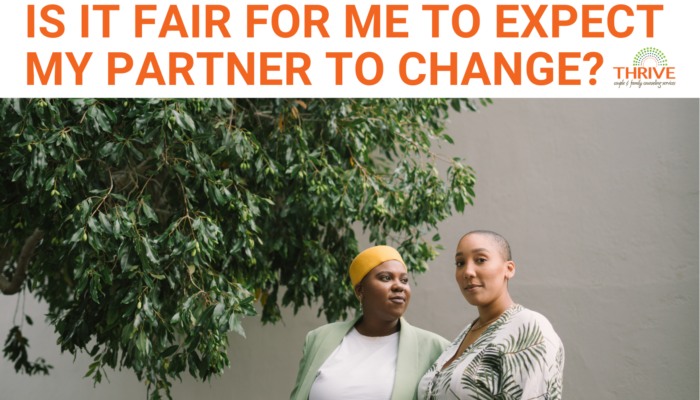Have you ever been tempted to ask your partner to change something about themselves? It’s okay if you have. In fact, it’s fairly common for people to feel like there is something about their partner that they can change if they try hard enough. However, attempting to change your partner can lead to misunderstandings, a negative cycle, or even damage your connection.
Why am I tempted to change my partner?
Everyone is different, so of course when two people spend a lot of time together, there will be some friction or even conflict. Even if it’s the person you love most in the world, sometimes people can just bug you!
Of course, this can also be related to your current stress level or other situational factors, but it’s common for people in relationships to find flaws with one another. Everyone is flawed, and that’s okay.
However, the research on couples is quite clear, it’s not actually the amount of conflict that a couple experiences that determines how healthy the relationship will be, it’s more about the quality of the connection in areas like warmth, feeling like you are cared for and accepted, and how couples navigate conflict. You can learn more about the one way of measuring this sense of security in your relationship here: A.R.E. You There For Me?
We work with couples every day who are reconnecting and renewing their relationships using Emotionally Focused Therapy (EFT).
Being in relationships with other people isn’t always easy!
To have a successful relationship that lasts, it’s natural to expect that changes and adjustments will have to occur along the way. As you move through different stages of your life, your needs will change and the way you relate to one another may also change. This is a natural part of being in relationships with other people over a long period of time.
You may have experienced this with friends in your life as well. You may go through periods of being closer to certain friends, and you may need to assert new boundaries from time to time.
How do relationships change?
It’s not just that sometimes you want to change your partner, you will likely also go through life changes, and also normal relationship changes and stages.
It’s impossible to predict everything you’ll face together when starting a relationship, so being able to adapt and go with the flow can be tremendously helpful when life throws those changes our way.
Change should be something that is ideally discussed and navigated by both partners. Going through major life changes are actually common spots for couples to start to get caught in negative cycles, and definitely one example of times when it might be good to get help from a couple therapist.
What are some common things people try to change about their partners?
Every couple is different, but we’ve noticed some patterns in the couples we work with at our Centennial counseling office. Here are some common thoughts we hear from people try to change about their partners:
- How do I change this habit I find annoying?
- How do I change the relationships they have with their family or friends?
- How do I change the way they respond emotionally to things?
- How do I change their sexual desire style?
- How do I change how much time they spend at work?
- How do I change their career goals or aspirations?
- How do I change their thoughts on having kids?
- How do I change the way they parent?
- How do I change their spending habits?
- How do I change how we divide labor in the household?
What’s so bad about trying to get my partner to change? Is it fair for me to expect my partner to change?
Going into a relationship expecting that someone will change is a recipe for resentment and almost a guarantee you will get caught in a negative cycle. More importantly, there is usually some much bigger thing we are going for when we try to change our partner. People get stuck on surface issues when what they are really wishing for is much deeper. They don’t ever actually get that need met because they get stuck into a surface debate or argument.
You have to look underneath the thing you wish to control for the Emotional Message.
It’s totally normal to have attachment longings, or things you wish for in your most important relationships. Underneath the surface of some of those topics above are deeper feelings. We call these attachment longings. What are they? They are universal desires to feel things like:
- Knowing I matter to you
- Knowing I am loveable to you
- Feeling accepted by you
- Trusting I won’t be rejected by you
- Knowing I won’t be abandoned or isolated in our relationship
- Feeling I am good enough for you
- Feeling seen and heard by you
- Knowing I’m not a burden to you
When couples can slow down the instinct to try to control their partner, we can begin to hear the emotional message underneath the control. Here’s how we help couples learn to exit the negative cycle and build a secure relationship using Emotionally Focused Therapy: How Do We Stop the Negative Cycle?
Why YOU should stop trying to control your partner
Don’t throw a pillow at us for this one, but remember, the only person you can control is yourself. In fact, it’s important in healthy relationships for each partner to consider, “What is my part of our negative cycle?”.
We often say, delivery counts for EVERYTHING in relationships. How vulnerable are you with your own emotions when you try to talk about something you want to change? Do you focus more on the impact on your or on criticizing your partner?
Close your eyes and picture a time in your life when someone didn’t like how you were doing things, or how you were feeling, and you could tell they wanted you to do it differently.
Did it feel good to you? Did it make you feel closer to that person? Did you actually stop doing the thing they didn’t like? If you did, how were you feeling inside about this person or the relationship between you? What happens to you if the list of things they didn’t like about you was long, or ever-changing?
How can I explore the emotions or longings under what I want my partner to change?
What couples fight about on the surface is not actually what is causing the hurt feelings and misunderstandings. While the surface level argument might be what has brought the emotions to the surface, usually there’s something bigger going on that’s leading to those heightened emotions. For example, let’s say you want your partner to change how much time they spend at work.
What is the driving force behind that desire? Are you looking for more support of your professional life? Do you need to feel like your relationship is still a priority to your partner? Are you feeling insecure about your role in their life? The next time an urge to change your partner comes up, try to dig a little deeper and see what is driving that urge. You may be surprised!
What can happen if I try to change my partner?
Becoming critical of your partner or focusing on the things about them that you don’t like is actually the start of the negative cycle for many couples.
Every relationship has something called a negative cycle. If you’ve ever wondered “Why do we have the same fight over and over?” you’re probably familiar with the idea of a negative cycle. A negative cycle is any repeated pattern of interaction that leaves you and your partner in a bad place emotionally and relationally.
Negative cycles tend to make couples feel stuck or like they’ll never be able to be close again. Thankfully, that’s not the truth!
Some things that people try to change about their partners are less harmful than others. For example, your partner having a habit of smacking their gum loudly is a lot different than your partner trying to control who you talk to or the work that you do.
Trying to change someone is really just trying to control what they do or how they behave. One partner controlling the other is a sign of an unhealthy relationship. Here’s How to Set Boundaries Effectively in a relationship with secure attachment.
Of course, we aren’t talking about wanting to change behaviors that cross over a line into abuse. You don’t have to tolerate that and you should get help from mental health professionals if you feel that is happening in your relationship. It’s fair to expect to be treated with respect, and if your partner constantly disrespects you or belittles you, it’s okay to ask them to change that. You’re allowed to set boundaries about the way you are treated in relationships.
Is there anything about my relationship that I can change?
Trying to change the person that your partner is (their personality, their thoughts and feelings, etc.) leads to resentment and disconnection. That doesn’t mean that nothing can change in a relationship though.
One thing that couples can change is the negative cycle they experience. The key is to work toward change as a unit, instead of one partner working against the other (even if they have good intentions). It’s possible to change the negative pattern in your relationship, especially if you’re working with an EFT therapist.
What can I do instead of trying to change my partner?
Instead of trying to change your partner, try to focus on things you do have control over. A great place to start is working to change the negative cycle that you + your partner are stuck in.
The first step is to notice the negative cycle – where does it come up for you? Are there patterns you can see in the way you interact with one another? Talking about this with your partner can be a way to grow closer. You’ll also feel like you’re working together instead of against each other.
Every day, our Emotionally Focused Couples Therapists see how beneficial it is for couples to work together against their problems instead of working against each other.
EFT gives us a framework to understand the negative patterns that our relationships fall into so we can work to undo those patterns. Instead of seeing the negative cycle as you versus your partner, you’ll learn to work with your partner against the negative patterns you’ve developed.
If you’re looking for more ways to improve your relationship, a couples therapist can be a great source of support. In couples therapy, you’ll explore how each of you feels in the relationship with the guidance of a therapist.
Sharing your experiences with one another can open up a greater level of understanding and empathy, and connect about more vulnerable things. Once you’ve identified how your negative cycle presents itself in your relationship, you can work to create a new, positive cycle of closeness, compassion, love, and support.
Our EFT therapists see the pain that comes from trying to turn someone into something they’re not in a relationship. If this is a dynamic you’re dealing with in your relationship, talking to a couples therapist can help you make sense of the negative cycle you’re in and how to break out of it.




